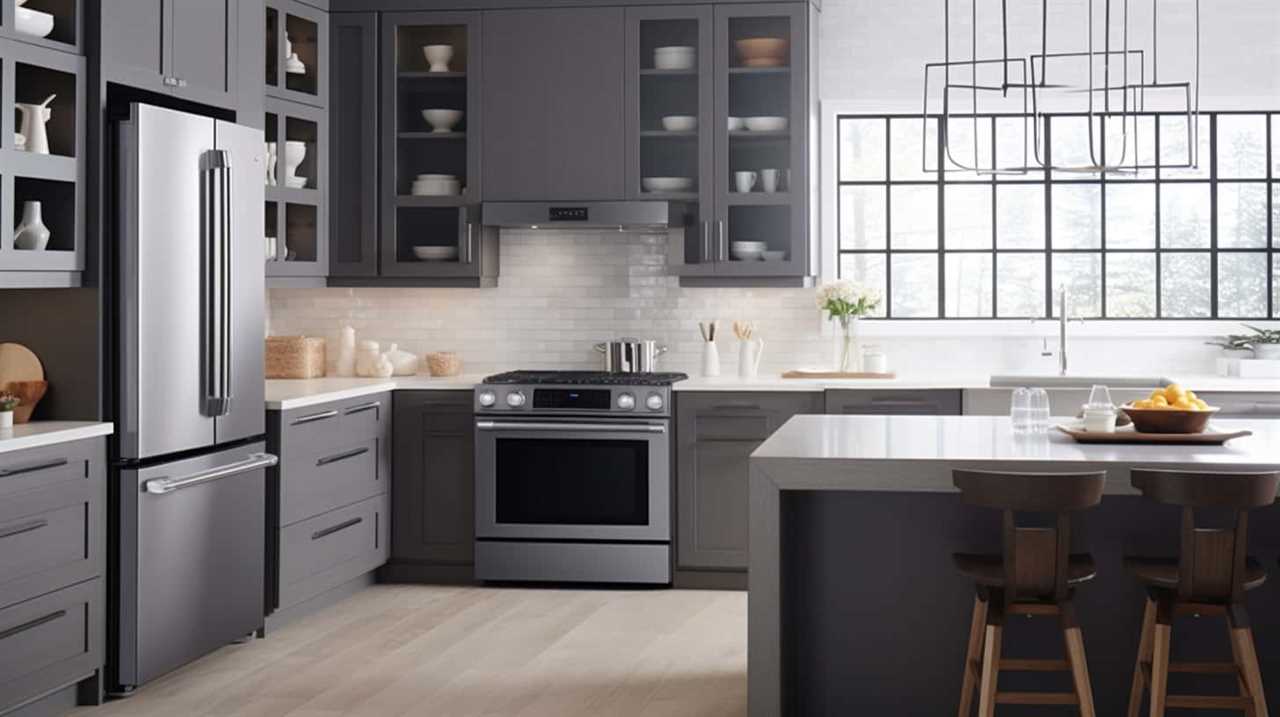In today’s modern world, where technology has a significant influence, it is important to think about how our actions affect energy usage and the environment.
One simple yet effective way to contribute to energy conservation is by unplugging appliances when they are not in use. This practice not only helps prevent electrical fires but also reduces standby power consumption, prolongs the lifespan of our appliances, and lowers our electricity bills.
By understanding the importance of unplugging appliances, we can take a proactive approach in minimizing our carbon footprint and preserving valuable resources.
In this article, we will delve deeper into the various reasons why we should unplug appliances when not in use, providing an insight into the environmental impact and the benefits it brings.

Key Takeaways
- Unplugging appliances reduces unnecessary power consumption and lowers energy bills.
- It helps prevent electrical fires, property damage, and enhances overall fire safety.
- Unplugging appliances extends their lifespan, reduces wear and tear, and minimizes the need for frequent replacements.
- Disconnecting appliances reduces standby power consumption, leading to substantial energy savings and a lower carbon footprint.
Energy Conservation
Energy conservation is achieved by unplugging appliances when they are not in use, thereby reducing unnecessary power consumption. This practice is an essential aspect of energy efficiency and sustainable living.
By simply unplugging appliances such as televisions, computers, and chargers when they are not being used, we can significantly reduce our energy consumption and lower our carbon footprint. Many appliances continue to draw power even when they are turned off or in standby mode, known as ‘vampire power.’ This wasted energy not only contributes to higher electricity bills but also puts a strain on our planet’s resources.
Prevention of Electrical Fires
Prevention of electrical fires is a critical concern for every household. Unplugging appliances when not in use is a simple yet effective way to minimize fire risks.
Fire Safety Through Unplugging
To ensure fire safety, it is crucial to unplug appliances when they are not in use. Electrical fires can be devastating, causing property damage, injuries, and even loss of life. Unplugging appliances is a simple yet effective way to prevent electrical fires. When appliances are left plugged in, they continue to draw power, which can lead to overheating and potential fire hazards. By unplugging appliances, you eliminate the risk of electrical malfunctions and reduce the likelihood of fires occurring.

Consider the following table, which highlights the importance of unplugging appliances for fire prevention:
| Potential Risks of Leaving Appliances Plugged In | Benefits of Unplugging Appliances |
|---|---|
| Increased risk of electrical malfunctions | Eliminates risk of fires |
| Higher energy consumption | Reduces energy waste |
| Greater chance of overheating | Prevents property damage |
| Elevated fire hazard | Enhances overall fire safety |
| Unnecessary wear and tear on appliances | Prolongs appliance lifespan |
Reducing Electrical Fire Risks
By taking steps to reduce electrical fire risks, we can ensure the safety of our homes and minimize the potential for devastating property damage, injuries, and loss of life. Here are four important measures to prevent electrical fires and promote home safety:
- Regular maintenance: Schedule professional inspections of your electrical system to identify and address any potential hazards. Replace outdated wiring and faulty components promptly.
- Overload prevention: Avoid overloading electrical outlets and extension cords by distributing the load across multiple circuits. Use power strips with built-in surge protectors to safeguard against voltage spikes.
- Proper wiring: Hire a licensed electrician to handle any electrical installations or repairs in your home. Ensure that all wiring is up to code and properly grounded to prevent electrical faults and short circuits.
- Energy efficiency: Upgrade to energy-efficient appliances and electronics to reduce the risk of overheating and electrical malfunctions. Look for devices with safety features such as automatic shut-off and overload protection.
Reduction of Standby Power Consumption
The reduction of standby power consumption can be achieved by disconnecting appliances when they are not in use. Standby power, also known as vampire power or phantom load, refers to the energy consumed by electronic devices when they are plugged in but not actively in use. Many people are not aware of the significant amount of energy wasted in this manner.
By raising awareness about standby power usage and promoting energy efficiency education, we can encourage individuals to unplug appliances or use power strips with on/off switches. This simple action can lead to substantial energy savings and lower electricity bills.

Being mindful of standby power consumption is crucial for those who desire mastery in energy efficiency and wish to contribute to a sustainable future.
Prolonging Appliance Lifespan
Prolonging the lifespan of our appliances is crucial for maximizing their value and reducing unnecessary expenses. When appliances are left plugged in, they continue to draw small amounts of power even when not in use, leading to increased wear and tear over time.
Reduces Wear and Tear
Unplugging appliances when not in use can reduce wear and tear, thereby extending the lifespan of the appliance. This simple habit can have a significant impact on the maintenance and efficiency of your appliances.
Here are four reasons why unplugging appliances reduces wear and tear:

- Power surges: Appliances left plugged in are vulnerable to power surges, which can cause damage to sensitive components. By unplugging them, you protect them from potential electrical spikes.
- Overheating: Some appliances continue to consume a small amount of electricity even when not in use. This constant flow of power can lead to overheating, which can damage internal parts. Unplugging the appliance eliminates this risk.
- Dust accumulation: Dust and debris can accumulate inside appliances, leading to reduced efficiency and increased strain on the motor. When unplugged, appliances have a chance to cool down and prevent dust buildup.
- Cord damage: Constantly plugging and unplugging appliances can cause wear on the power cords, leading to potential short circuits or electrical hazards. By unplugging appliances when not in use, you reduce the risk of cord damage.
Saves on Energy Bills
Using less energy by unplugging appliances when not in use can lead to significant savings on energy bills while also extending the lifespan of your appliances.
By reducing the amount of electricity consumed, you can effectively lower your carbon footprint and promote sustainable living.
When appliances are left plugged in, they continue to draw power even when not actively in use, resulting in unnecessary energy consumption.
This wasted energy not only contributes to higher energy bills but also puts unnecessary strain on the appliances, leading to premature wear and tear.

By unplugging appliances, you can save money on your energy bills and help protect the environment by reducing energy waste.
Additionally, prolonging the lifespan of your appliances reduces the need for frequent replacements, which further promotes sustainable living.
Lowering Electricity Bills
Consistently turning off appliances when they are not in use can significantly reduce electricity costs. By following energy saving tips and investing in energy-efficient appliances, you can further lower your electricity bills. Here are four ways to do it:
- Choose energy-efficient appliances: Look for appliances with the Energy Star label, as they are designed to use less energy without sacrificing performance.
- Unplug electronics when not in use: Even when turned off, many electronics continue to draw power. Unplugging them can save energy and reduce your bills.
- Use power strips: Connect multiple appliances to a power strip and turn it off when not in use. This prevents vampire power consumption, where appliances still draw power even when turned off.
- Optimize your heating and cooling: Set your thermostat to an energy-saving temperature and use programmable thermostats to adjust the temperature according to your schedule.
Environmental Impact
One significant reason to disconnect appliances when not in use is the potential environmental impact. By unplugging appliances, we can reduce our carbon footprint and promote sustainable practices. Even when appliances are turned off, they often continue to draw power, known as standby power or vampire power, which can contribute to unnecessary energy consumption and greenhouse gas emissions. According to the U.S. Department of Energy, vampire power can account for up to 10% of total household energy use.

Frequently Asked Questions
Are All Appliances Equally Affected by Standby Power Consumption?
Not all appliances are equally affected by standby power consumption. Energy efficient appliances are designed to minimize this consumption through various techniques such as low-power modes, automatic shut-off, and power management features.
Can Unplugging Appliances Really Reduce the Risk of Electrical Fires?
Unplugging appliances when not in use is essential to reduce the potential dangers of electrical fires caused by power surges. By disconnecting from power sources, the risk of fire can be significantly mitigated, ensuring safety and peace of mind.
How Much Electricity Is Wasted Due to Standby Power Consumption?
Standby power consumption, or the electricity used by appliances in standby mode, has a significant impact on overall energy consumption in households. Accurate measurement methods are essential to understand and address this issue effectively.
Does Unplugging Appliances Really Help in Prolonging Their Lifespan?
Unplugging appliances when not in use can indeed help prolong their lifespan. By reducing standby power consumption and avoiding unnecessary wear and tear, appliances are able to operate more efficiently and effectively, leading to longer-lasting performance.

What Are Some Tips to Remember When Unplugging Appliances to Maximize Energy Conservation?
To maximize energy conservation when unplugging appliances, it is important to follow energy-saving techniques such as using power strips. Power strips allow for easy and efficient management of multiple devices, reducing standby power consumption and promoting energy efficiency.
Conclusion
In conclusion, unplugging appliances when not in use is essential for:
- Energy conservation
- Preventing electrical fires
- Reducing standby power consumption
- Prolonging appliance lifespan
- Lowering electricity bills
- Minimizing environmental impact
It is a simple and effective practice that can make a significant difference in both our individual lives and the overall sustainability of our planet.
So, let’s make it a habit to unplug appliances and contribute to a greener future.










